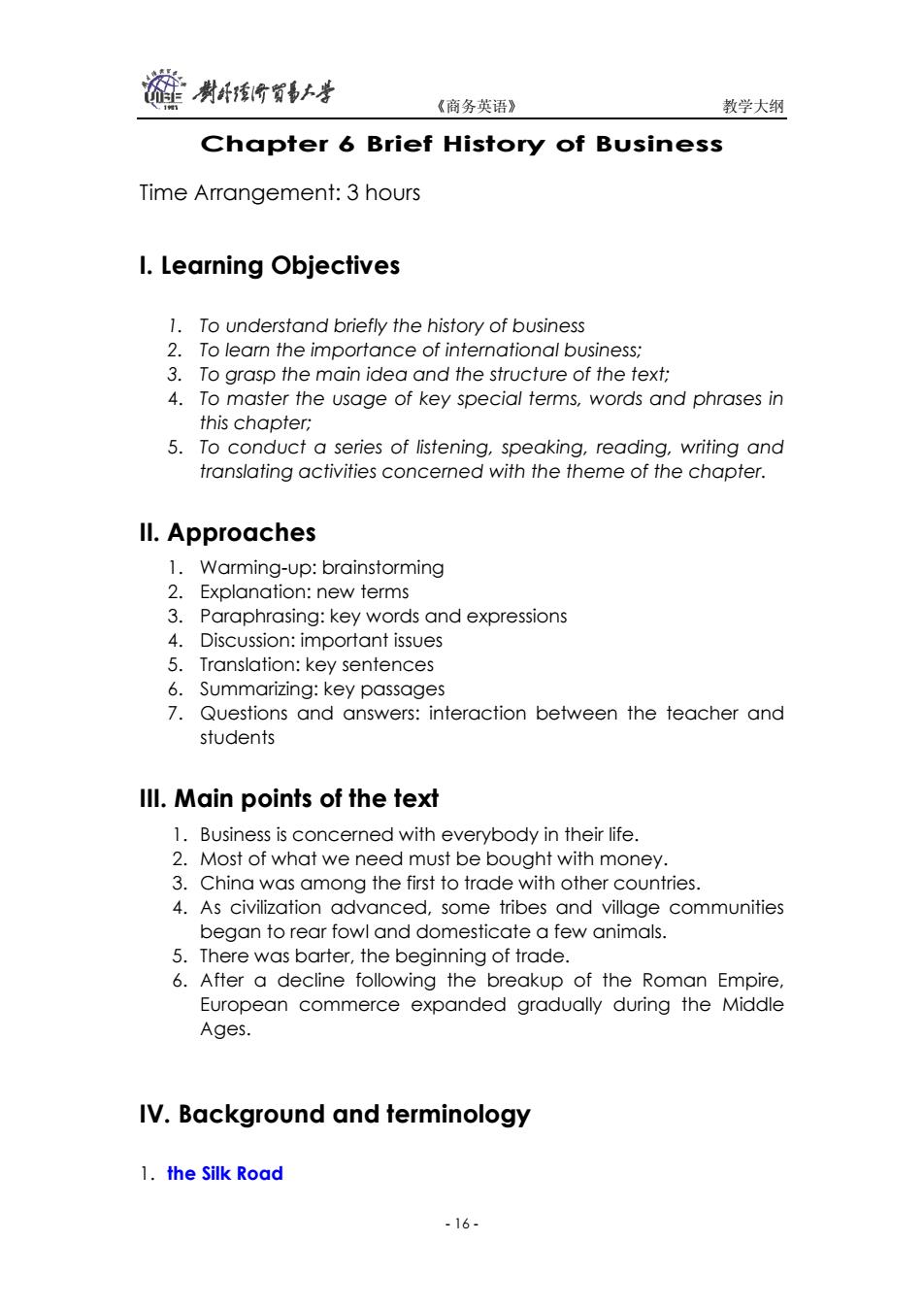
莲剥有首影上号 《商务英语》 教学大纲 Chapter 6 Brief History of Business Time Arrangement:3 hours I.Learning Objectives 1.To understand briefly the history of business 2.To learn the importance of international business; 3.To grasp the main idea and the structure of the text; 4.To master the usage of key special terms,words and phrases in this chapter; 5.To conduct a series of listening,speaking,reading,writing and translating activities concerned with the theme of the chapter. ll.Approaches 1.Warming-up:brainstorming 2.Explanation:new terms 3.Paraphrasing:key words and expressions 4.Discussion:important issues 5.Translation:key sentences 6.Summarizing:key passages 7.Questions and answers:interaction between the teacher and students Ill.Main points of the text 1.Business is concerned with everybody in their life 2.Most of what we need must be bought with money. 3.China was among the first to trade with other countries. 4.As civilization advanced,some tribes and village communities began to rear fowl and domesticate a few animals. 5.There was barter,the beginning of trade. 6.After a decline following the breakup of the Roman Empire, European commerce expanded gradually during the Middle Ages. IV.Background and terminology 1.the Silk Road -16-
《商务英语》 教学大纲 - 16 - Chapter 6 Brief History of Business Time Arrangement: 3 hours I. Learning Objectives 1. To understand briefly the history of business 2. To learn the importance of international business; 3. To grasp the main idea and the structure of the text; 4. To master the usage of key special terms, words and phrases in this chapter; 5. To conduct a series of listening, speaking, reading, writing and translating activities concerned with the theme of the chapter. II. Approaches 1. Warming-up: brainstorming 2. Explanation: new terms 3. Paraphrasing: key words and expressions 4. Discussion: important issues 5. Translation: key sentences 6. Summarizing: key passages 7. Questions and answers: interaction between the teacher and students III. Main points of the text 1. Business is concerned with everybody in their life. 2. Most of what we need must be bought with money. 3. China was among the first to trade with other countries. 4. As civilization advanced, some tribes and village communities began to rear fowl and domesticate a few animals. 5. There was barter, the beginning of trade. 6. After a decline following the breakup of the Roman Empire, European commerce expanded gradually during the Middle Ages. IV. Background and terminology 1. the Silk Road
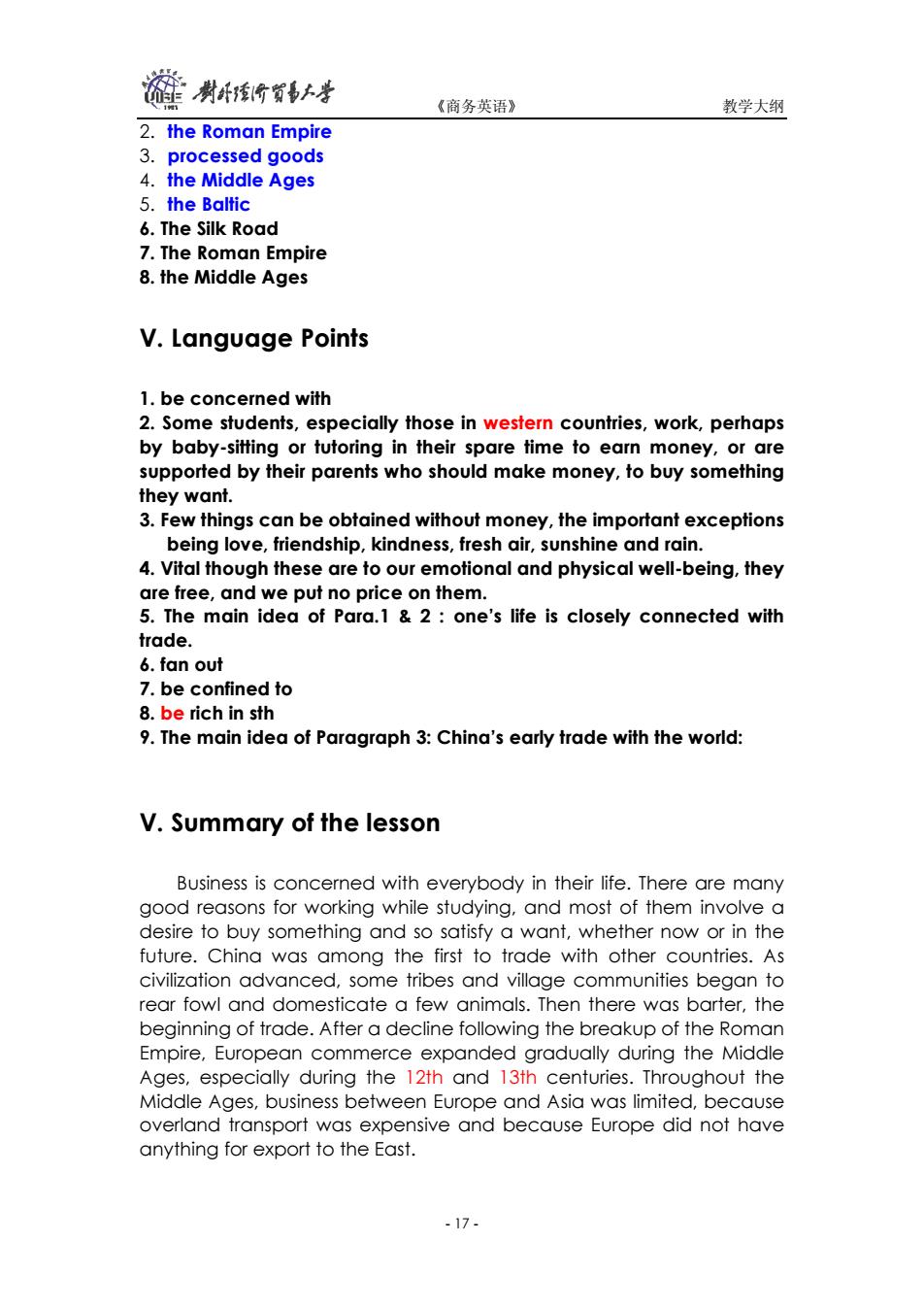
游肉乐新首才 《商务英语》 教学大纲 2.the Roman Empire 3.processed goods 4.the Middle Ages 5.the Baltic 6.The Silk Road 7.The Roman Empire 8.the Middle Ages V.Language Points 1.be concerned with 2.Some students,especially those in western countries,work,perhaps by baby-sitting or tutoring in their spare time to earn money,or are supported by their parents who should make money,to buy something they want. 3.Few things can be obtained without money,the important exceptions being love,friendship,kindness,fresh air,sunshine and rain. 4.Vital though these are to our emotional and physical well-being,they are free,and we put no price on them. 5.The main idea of Para.1 2:one's life is closely connected with trade. 6.fan out 7.be confined to 8.be rich in sth 9.The main idea of Paragraph 3:China's early trade with the world: V.Summary of the lesson Business is concerned with everybody in their life.There are many good reasons for working while studying,and most of them involve a desire to buy something and so satisfy a want,whether now or in the future.China was among the first to trade with other countries.As civilization advanced,some tribes and village communities began to rear fowl and domesticate a few animals.Then there was barter,the beginning of trade.After a decline following the breakup of the Roman Empire,European commerce expanded gradually during the Middle Ages,especially during the 12th and 13th centuries.Throughout the Middle Ages,business between Europe and Asia was limited,because overland transport was expensive and because Europe did not have anything for export to the East. -17-
《商务英语》 教学大纲 - 17 - 2. the Roman Empire 3. processed goods 4. the Middle Ages 5. the Baltic 6. The Silk Road 7. The Roman Empire 8. the Middle Ages V. Language Points 1. be concerned with 2. Some students, especially those in western countries, work, perhaps by baby-sitting or tutoring in their spare time to earn money, or are supported by their parents who should make money, to buy something they want. 3. Few things can be obtained without money, the important exceptions being love, friendship, kindness, fresh air, sunshine and rain. 4. Vital though these are to our emotional and physical well-being, they are free, and we put no price on them. 5. The main idea of Para.1 & 2 : one’s life is closely connected with trade. 6. fan out 7. be confined to 8. be rich in sth 9. The main idea of Paragraph 3: China’s early trade with the world: V. Summary of the lesson Business is concerned with everybody in their life. There are many good reasons for working while studying, and most of them involve a desire to buy something and so satisfy a want, whether now or in the future. China was among the first to trade with other countries. As civilization advanced, some tribes and village communities began to rear fowl and domesticate a few animals. Then there was barter, the beginning of trade. After a decline following the breakup of the Roman Empire, European commerce expanded gradually during the Middle Ages, especially during the 12th and 13th centuries. Throughout the Middle Ages, business between Europe and Asia was limited, because overland transport was expensive and because Europe did not have anything for export to the East
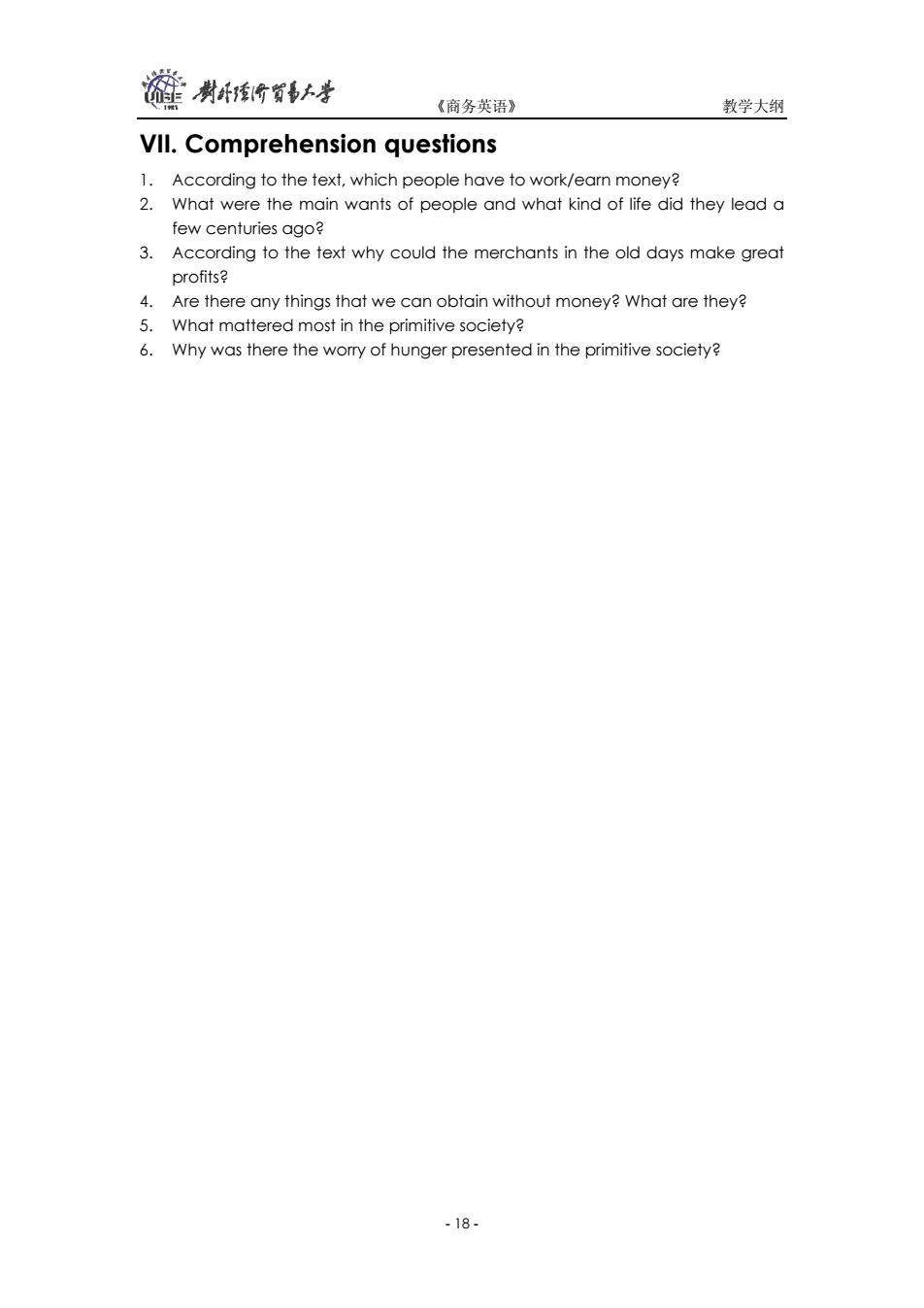
旌黄有手 《商务英语》 教学大纲 VIl.Comprehension questions 1.According to the text,which people have to work/earn money? 2.What were the main wants of people and what kind of life did they lead a few centuries ago? 3.According to the text why could the merchants in the old days make great profits? 4.Are there any things that we can obtain without money?What are they? 5.What mattered most in the primitive society? 6.Why was there the worry of hunger presented in the primitive society? -18-
《商务英语》 教学大纲 - 18 - VII. Comprehension questions 1. According to the text, which people have to work/earn money? 2. What were the main wants of people and what kind of life did they lead a few centuries ago? 3. According to the text why could the merchants in the old days make great profits? 4. Are there any things that we can obtain without money? What are they? 5. What mattered most in the primitive society? 6. Why was there the worry of hunger presented in the primitive society?
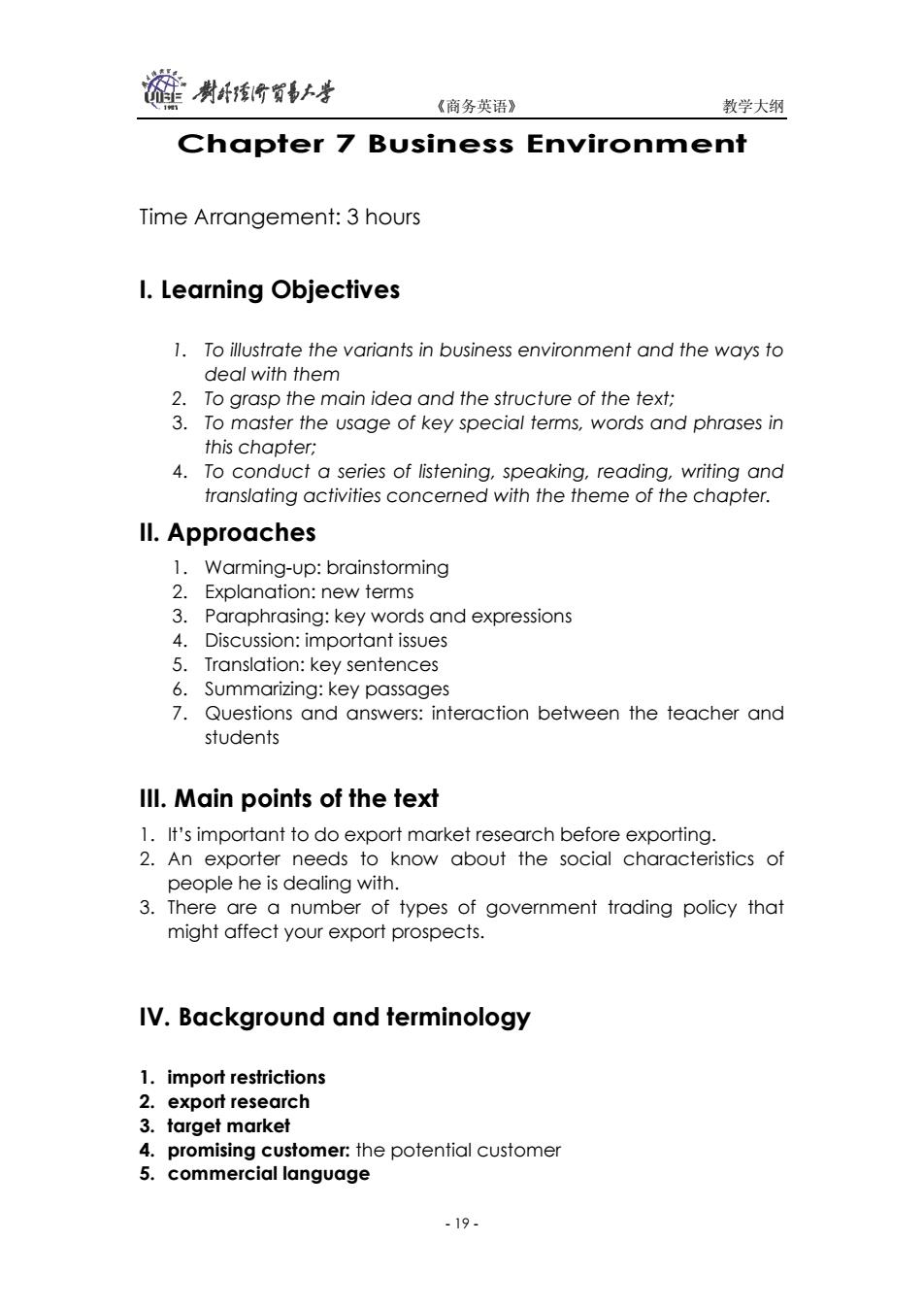
莲黄将贺号 《商务英语》 教学大纲 Chapter 7 Business Environment Time Arrangement:3 hours I.Learning Objectives 1.To illustrate the variants in business environment and the ways to deal with them 2.To grasp the main idea and the structure of the text; 3.To master the usage of key special terms,words and phrases in this chapter; 4.To conduct a series of listening,speaking,reading,writing and translating activities concerned with the theme of the chapter. ll.Approaches 1.Warming-up:brainstorming 2.Explanation:new terms 3.Paraphrasing:key words and expressions 4.Discussion:important issues 5.Translation:key sentences 6.Summarizing:key passages 7.Questions and answers:interaction between the teacher and students Ill.Main points of the text 1.It's important to do export market research before exporting. 2.An exporter needs to know about the social characteristics of people he is dealing with. 3.There are a number of types of government trading policy that might affect your export prospects. IV.Background and terminology 1.import restrictions 2.export research 3.target market 4.promising customer:the potential customer 5.commercial language -19
《商务英语》 教学大纲 - 19 - Chapter 7 Business Environment Time Arrangement: 3 hours I. Learning Objectives 1. To illustrate the variants in business environment and the ways to deal with them 2. To grasp the main idea and the structure of the text; 3. To master the usage of key special terms, words and phrases in this chapter; 4. To conduct a series of listening, speaking, reading, writing and translating activities concerned with the theme of the chapter. II. Approaches 1. Warming-up: brainstorming 2. Explanation: new terms 3. Paraphrasing: key words and expressions 4. Discussion: important issues 5. Translation: key sentences 6. Summarizing: key passages 7. Questions and answers: interaction between the teacher and students III. Main points of the text 1. It’s important to do export market research before exporting. 2. An exporter needs to know about the social characteristics of people he is dealing with. 3. There are a number of types of government trading policy that might affect your export prospects. IV. Background and terminology 1. import restrictions 2. export research 3. target market 4. promising customer: the potential customer 5. commercial language
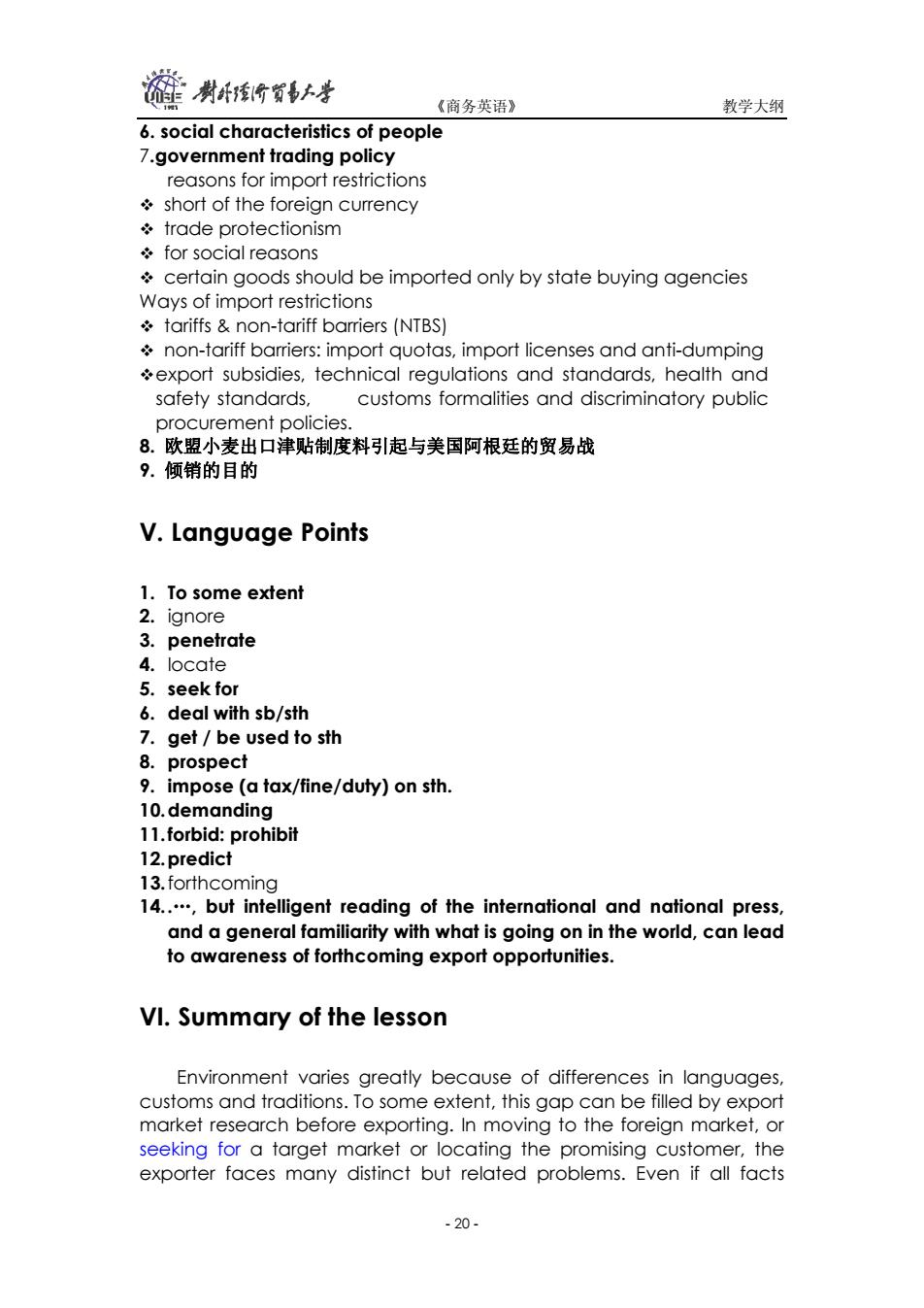
旌黄有寸 《商务英语》 教学大纲 6.social characteristics of people 7.government trading policy reasons for import restrictions short of the foreign currency trade protectionism ÷for social reasons certain goods should be imported only by state buying agencies Ways of import restrictions tariffs non-tariff barriers (NTBS) non-tariff barriers:import quotas,import licenses and anti-dumping export subsidies,technical regulations and standards,health and safety standards, customs formalities and discriminatory public procurement policies. 8.欧盟小麦出口津贴制度料引起与美国阿根廷的贸易战 9.倾销的目的 V.Language Points 1.To some extent 2.ignore 3.penetrate 4.locate 5.seek for 6.deal with sb/sth 7.get be used to sth 8.prospect 9.impose (a tax/fine/duty)on sth. 10.demanding 11.forbid:prohibit 12.predict 13.forthcoming 14....,but intelligent reading of the international and national press, and a general familiarity with what is going on in the world,can lead to awareness of forthcoming export opportunities. VI.Summary of the lesson Environment varies greatly because of differences in languages, customs and traditions.To some extent,this gap can be filled by export market research before exporting.In moving to the foreign market,or seeking for a target market or locating the promising customer,the exporter faces many distinct but related problems.Even if all facts -20-
《商务英语》 教学大纲 - 20 - 6. social characteristics of people 7.government trading policy reasons for import restrictions short of the foreign currency trade protectionism for social reasons certain goods should be imported only by state buying agencies Ways of import restrictions tariffs & non-tariff barriers (NTBS) non-tariff barriers: import quotas, import licenses and anti-dumping export subsidies, technical regulations and standards, health and safety standards, customs formalities and discriminatory public procurement policies. 8. 欧盟小麦出口津贴制度料引起与美国阿根廷的贸易战 9. 倾销的目的 V. Language Points 1. To some extent 2. ignore 3. penetrate 4. locate 5. seek for 6. deal with sb/sth 7. get / be used to sth 8. prospect 9. impose (a tax/fine/duty) on sth. 10.demanding 11.forbid: prohibit 12.predict 13.forthcoming 14..…, but intelligent reading of the international and national press, and a general familiarity with what is going on in the world, can lead to awareness of forthcoming export opportunities. VI. Summary of the lesson Environment varies greatly because of differences in languages, customs and traditions. To some extent, this gap can be filled by export market research before exporting. In moving to the foreign market, or seeking for a target market or locating the promising customer, the exporter faces many distinct but related problems. Even if all facts